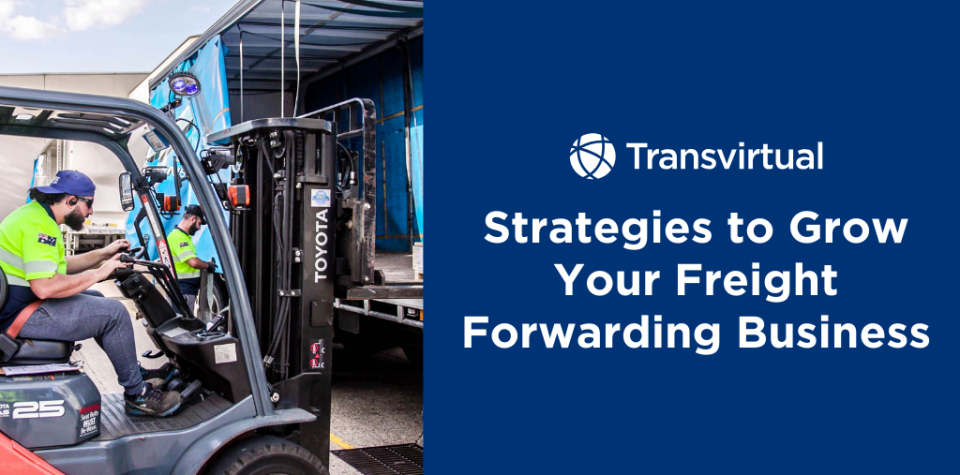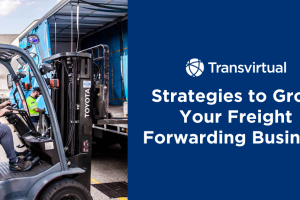Table of Contents
Shipping stuff used to be so simple. It didn’t matter if it was going down the street, across a city, out to the Outback or all the way from Australia to the other side of the world: you could simply pop your customer’s goods onto the appropriate mode of conveyance, and it would get to its destination…eventually.
But global conflict and health risks often put a wedge on supply chains, complicating delivery logistics networks worldwide.
Added to that, customer expectation has changed dramatically. Clients need their goods shipped ASAP and customers wish to receive the products they’ve purchased in record time.
So in these tricky times, how do you maximise your freight forwarding company’s efficiency and customer satisfaction, ensure that your bottom line remains viable, generate new clients and retain your existing ones?
We’ve put together a consignment of freight-forwarding strategies that can help you do this and boost sales. So let’s open up the box and have a look.
Freight Forwarding in the 21st Century
Freight forwarding companies add significant value to a supplier’s customer service. Freight forwarders can simplify a company’s supply chain by providing the infrastructure, knowledge and logistics required to get products through some (or all) of the supply chain. They have access to transport and warehousing and can connect various separate sections of the dispatch/delivery process together.
But as well as providing a fantastic service for your existing customers, you need to gain new clients as well, right? That’s how your business will keep growing. In an increasingly cluttered, fragmented and chaotic world, getting your freight forwarding company’s name to stand out from the crowd can be difficult.
Luckily, there are some simple ways that you can make your service more visible to search engines. And when a client Googles the phrase “best freight forwarders near me” your company will rank high up on the search engine results page (SERP).
Here are seven easy strategies you can employ to improve your position on the SERP, impress your existing clients, and get those new customers rolling in.
How to Increase Freight Forwarding Sales
1) Be memorable
Great service builds great customer relationships. And when your customers are happy and satisfied with your service, they’ll tell their friends. But you’re going to have to be hands on in order to provide that great service.
Having the most up-to-date software systems (such as a Freight Management System) to manage your client’s freight journey — from pick-up and warehousing to final delivery, sign-off and billing — is going to make a big difference.
To do this, think about how you can improve or modify some or all of the following aspects of your business:
Provide a single point of contact for your customers.
Use technology to rapidly solve problems such as changing traffic patterns.
Keep clients informed of your latest services.
Provide instant support via text, email and messaging.
Invest in a robust driver support app to give your staff the ability to deliver on time whatever situations they encounter en route.
So, when your clients know that their consignment of (notoriously easy-to-lose) 10mm sockets destined for Alice Springs is going to get there on time, regardless of bushfires, washouts, mobs of cattle on the track or a shortage of Chicko Rolls at the Coober Pedy Roadhouse, they are going to keep using your freight forwarding service.
2) Specialities and niches
Being able to tell your customers “yep, we can do that” is a guaranteed way to generate both word-of-mouth referrals and great online reviews of your service. Adding specialist freighting solutions to your operation can set you apart from competitors and generate higher income, especially if you can undertake tricky deliveries.
You might try specializing in deliveries to out-of-the-way destinations that require 4WDs, offer a certified Dangerous Goods freight service, target B2B or B2C e-commerce customers, or develop a reputation for being a specialist in forwarding ugly freight.
These and other specialities and niches can be merged with your existing freight forwarding operation to not only add value to your service but to draw in new customers looking for specialist knowledge.
3) Know your stuff

Your customers need to have faith in your abilities. A big component in getting those online and personal referrals (as well as attracting the attention of search engines) is ensuring that the so-called “trust gap” between you and potential clients is as narrow as possible.
A simple way to do this is by sharing your knowledge.
Your website should include information about the latest developments in logistics, current industry challenges, case studies and statistics, the latest technological integrations, and tips to help your customers overcome common logistical challenges. Your website is often the first point of contact with new customers, so it must showcase your expertise immediately.
There are a number of ways that you can do this, including:
Short informative videos.
Podcasts on platforms such as YouTube, Spotify, or even LinkedIn.
Articles and blog posts on your website and links to industry, magazines, or websites.
And that third option leads us nicely to our next strategy, digital marketing.
4) Invest in digital marketing workflows
Generating sales leads through advertising, digital business cards and phone calls is all well and good. But these days, potential clients who approach you because they found you on the web are far more likely to become permanent customers. Aligning your digital marketing strategies with the efforts of your sales team can further enhance customer engagement and sales success.
Digital marketing relies heavily on having a good website and adhering to what you might call “rules of engagement.” These can include:
Automated email workflows. Sending emails out to existing clients, and automatically following up on inquiries from potential clients, is the most basic form of digital marketing.
Customer segmentation. Whatever your client base is, you can break it down into “segments” that can be targeted with appropriate content. This content can be in the form of emails, OTT advertising or even social media posts, depending on your target audience’s preferences and habits.
Keep it simple. A cluttered or hard-to-navigate site means customers will soon tire of it and find an easier place to search for their freight forwarding requirements. So keep your pages to a minimum.
Customer reviews are gold. Encourage your existing customers to leave reviews with an easy-to-use review page.
Navigate to me. List your freight forwarding business with mapping sites such as Google Maps and Yelp so that when a potential client searches “freight forwarding operators near me” yours will appear at the top of the SERP.
Go organic. A blog page that is regularly updated with fresh content will keep the search engines coming back to your website. Hire a copywriter to generate content that includes SEO keywords related to your freight forwarding business.
5) Networks are a necessity
Freight forwarding agents need to be actively involved in a logistics network. This involvement not only facilitates connections but also enhances the ability to offer comprehensive logistics services. That’s not to say you need to be cozying up to the competition.
But in order to facilitate things such as freight consolidation, access to economies of scale in shipping, containers and fleets, and connect with operators across the globe, networks are vital.
So link up with industry networks, such as SCLAA, and spread your reach as far as possible. Who knows where your next client might be located!
6) See and be seen
Trade shows and conferences are great places to showcase your freight forwarding company. Interpersonal connections are worth much more than cold-calling and automated emails. A trade show booth is a great place to meet your clients face-to-face, answer their questions and build relationships.
Not only that, but by attending trade shows and conferences, you will collect lots of stories and information that can be converted into content to share on your website’s blog page. Additionally, these events provide opportunities to explore new markets and expand your business reach.
7) Keep talking
From the time you receive an initial inquiry from a potential customer to the delivery of their consignment to its correct location, you need to be constantly communicating. Your system should be able to deliver automated updates throughout the delivery process to ease any anxiety the customer may have about the journey of their goods.
By doing this, you’ll show them that they can count on you and your team as professional freight forwarders. In turn, they will recommend you to other potential clients, post good reviews on your website’s customer feedback page, and thus push your business up the search results page.
Developing Industry Expertise
Freight forwarding is a fast-paced industry. Keeping up means monitoring industry insights and honing your skills and expertise.
But how do you ensure your freight forwarding company remains at the cutting edge of the logistics industry? Aside from browsing the internet/ social media for insights or attending events, here are more ways to develop and maintain your industry expertise.
Participate in online forums: Join forums related to freight forwarding and logistics, and actively participate in discussions. You’ll gain valuable knowledge and might even find solutions to challenges your freight forwarding company faces.
Develop specialized knowledge: Specializing in areas such as customs clearance, warehousing, or transportation management can set your freight forwarding business apart from the competition. Invest time in developing expertise in these areas, and consider obtaining relevant certifications to showcase your knowledge.
Collaborate with other experts: Networking with other industry experts can provide valuable insights and best practices. Collaborate with professionals in the logistics industry to share knowledge and learn from their experiences. This can help you stay ahead of the curve and continuously improve your freight forwarding service.
By developing industry expertise, your freight forwarding company can differentiate itself from competitors and provide exceptional value to clients. Stay informed, keep learning, and watch your business grow.
Australian-Made Freight Software for Australian Freight Forwarders
At Transvirtual, we understand the unique set of circumstances that Australian delivery and logistics companies operate under. We pride ourselves in our ability to custom-design that is perfect for your operation: wherever it is and whatever sector of the supply chain you service.
So if you would like to learn more about how our FMS, transport management, and warehouse management systems can enhance your freight forwarding strategies, let us know. We’d love to hear from you and help your company move forward.



